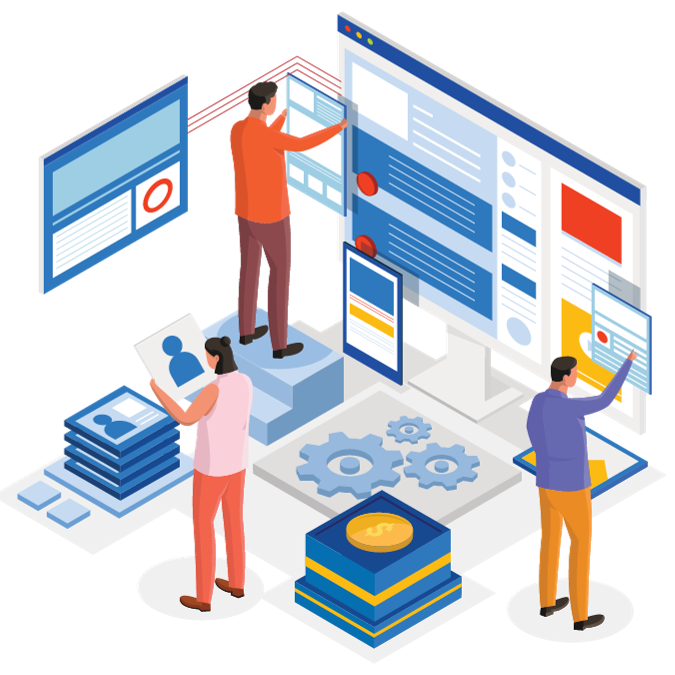In today's fast-paced business environment, the need for efficient, integrated, and comprehensive software solutions has never been greater. Zoho One, a powerful suite of applications designed to enhance business processes, has gained popularity as an all-in-one solution. However, implementing Zoho One can present challenges, but fear not - this blog post will explore some of the common challenges in Zoho One Implementation and provide solutions to overcome them.

What is Zoho One Implementation?
Before diving into the common challenges and solutions associated with Zoho One implementation, let's begin by understanding what Zoho One implementation entails.
Zoho One is a comprehensive software solution that combines a wide range of business applications, including customer relationship management (CRM), project management, email marketing, and more, into a single, unified platform. Zoho One implementation refers to the process of adopting and integrating the Zoho One suite of applications into an organization's existing infrastructure and workflows.
Zoho One is a comprehensive software solution that combines a wide range of business applications, including customer relationship management (CRM), project management, email marketing, and more, into a single, unified platform. Zoho One implementation refers to the process of adopting and integrating the Zoho One suite of applications into an organization's existing infrastructure and workflows.

Common Challenges in Zoho One Implementation And How to Solve them
1. Resistance to Change
One of the biggest challenges when implementing Zoho One is employee resistance to change. Switching to a new system can be daunting for those accustomed to old processes. To tackle this challenge, it's essential to involve employees from the beginning. Conduct thorough training sessions, emphasizing the benefits and efficiency gains the new system will bring. Change management is a critical aspect of Zoho One implementation. Many employees may be comfortable with the existing tools they use, and they might not see the immediate advantages of transitioning to a new system. To address this challenge:
Involve Employees from the Start: Before you start implementing Zoho One, involve key employees in the decision-making process. Seek their input, understand their pain points with the current tools, and show them how Zoho One can solve those issues.
Effective Training: A lack of understanding and familiarity with the new system can cause resistance. Offer comprehensive training sessions to ensure that your team knows how to use Zoho One effectively. Zoho provides training resources, and you can also consider customized training sessions.
Open Communication: Maintain an open line of communication for feedback and support. Encourage employees to share their concerns and suggestions, and address them promptly. This fosters a sense of ownership and involvement in the implementation process.
2. Data Migration
Transferring existing data to Zoho One can be a tricky endeavor. The key to a successful data migration is to plan meticulously. Evaluate the data you need to transfer, clean and organize it, and ensure compatibility with Zoho One's data structure. Consider hiring experts or utilizing Zoho's support services to assist in this process. Data migration is a crucial step in Zoho One implementation because it involves moving vital information from your old systems to the new one. To overcome this challenge:
Assessment and Planning: Begin by assessing the data you have and determining what needs to be migrated. Not all data may be relevant in your new Zoho One setup, so prioritize and plan accordingly.
Data Cleaning: Ensure that the data is clean and accurate. Duplicate entries and outdated information can complicate the migration process. Consider data cleaning tools or manual checks to address this issue.
Zoho's Support Services: Zoho offers migration services and tools that can help you with the transition. Their experts can guide you through the process, ensuring data consistency and integrity.
Data Mapping: Ensure that your data is mapped correctly to the appropriate fields within Zoho One. Misaligned data can lead to confusion and errors down the road.
3. Customization
3. Customization
Zoho One offers a wide range of applications, and customization is key to ensuring the software aligns with your business's unique requirements. The challenge here is to find the right balance. Too much customization can lead to complexity and maintenance issues, while too little can hinder productivity. Work closely with Zoho partner to strike the right balance and make your Zoho One implementation truly tailored to your needs. Here are some steps to navigate this challenge:
Define Your Requirements: Before implementing Zoho One, clearly define your business requirements. What specific features do you need? What are your workflows and processes? This understanding will guide your customization efforts.
Consult with Experts: Zoho One offers consultation services where their experts can guide you in tailoring the system to your needs. They can recommend best practices and help you avoid over-complication.
Prioritize Customization: Prioritize your customization efforts by focusing on the most critical aspects of your business operations. Avoid unnecessary tweaks that can lead to maintenance challenges and increased complexity.
Regular Audits: Periodically review and audit your customizations. As your business evolves, your needs may change, and certain customizations may become obsolete. Regular audits ensure that your Zoho One setup remains efficient and relevant.
4. Integration Challenges
Zoho One is designed to perfect your business processes, but integrating it with existing systems can be a challenge in Zoho One implementation. You may have legacy software or other tools that need to work seamlessly with Zoho. Zoho offers APIs and connectors for many popular applications, but it's important to evaluate and plan these integrations carefully. Here's how to address integration challenges.
Assessment and Compatibility: Identify the existing systems and tools you need to integrate with Zoho One. Evaluate the compatibility of these systems with Zoho's APIs and connectors.
Zoho's Integrations: Zoho provides a variety of pre-built integrations for popular applications. Leverage these integrations where possible, as they are designed for smooth compatibility.
Custom Development: If pre-built integrations are not available or do not meet your needs, consider custom development. Zoho's development platform allows for the creation of custom integrations tailored to your specific requirements.
Testing and Quality Assurance: Rigorously test your integrations to ensure that data flows seamlessly and that there are no disruptions in your business processes. Regularly monitor and update integrations as needed.
5. Cost-Management
Cost management can be a challenge when implementing Zoho One. The software is offered on a subscription basis, and costs can add up quickly as you add more users and modules. Monitor your usage closely and make adjustments as needed. Zoho One's pricing is flexible, so take advantage of their pay-as-you-grow model. Zoho One's subscription-based pricing model offers flexibility but also requires careful cost management. Here are some strategies to address this challenge:
Start with Essentials: Begin with the essential applications your business needs the most. You don't need to implement every module right away. As your business grows and your needs change, you can gradually add more applications.
Regular Usage Monitoring: Keep a close eye on the number of users and the modules in use. Review usage patterns regularly to identify any underutilized resources that can be scaled back to save costs.
Budget Allocation: Set a clear budget for Zoho One and stick to it. Consider the long-term return on investment, factoring in the productivity gains and efficiency improvements the system brings.
6. Security Concerns
Data security is always a top one priority for every business. With the increasing importance of data security, implementing a new software system raises concerns about safeguarding sensitive information. Zoho One provides robust security features, including data encryption and role-based access controls. Ensure your team is well-versed in these security measures and consider setting up regular security audits. Zoho One provides several security features, but addressing this challenge requires a proactive approach:
Access Control: Utilize Zoho One's role-based access control to restrict data access to only authorized personnel. Define user roles and permissions carefully to ensure data privacy.
Data Encryption: Ensure that sensitive data is encrypted both in transit and at rest. Zoho One includes encryption mechanisms to protect your data from unauthorized access.
Regular Security Audits: Conduct periodic security audits to identify vulnerabilities and potential threats. Address any issues promptly to maintain the integrity of your data.
User Training: Train your team on best practices for data security. Employees should be aware of the importance of data protection and their role in maintaining a secure environment.
How Zoho Partner Can Help With Your Zoho One Implementation
A Zoho Partner is a trusted business or individual that collaborates with Zoho Corporation to provide a range of services related to Zoho's suite of cloud-based software products. These partners assist businesses by offering services such as software sales, implementation, customization, training, support, and consultation. Zoho Partners play a crucial role in helping organizations leverage Zoho's applications to streamline operations, enhance productivity, and achieve their specific business objectives.
BMI, as a Premium Zoho Partner, holds a higher level of expertise and certification in Zoho products, making them well-equipped to assist businesses with Zoho One implementation.
BMI can ensure that your Zoho One setup is well-tailored to your business, integrated with your existing systems, and optimized for efficiency and productivity. BMI's support extends beyond the implementation phase, providing ongoing assistance and strategic guidance to help your business thrive using Zoho One.
Conclusion
While implementing Zoho One can pose its own set of challenges, the benefits of this all-in-one business solution far outweigh the difficulties. By addressing these common challenges with thoughtful planning, employee involvement, and ongoing support, you can ensure a smooth Zoho One implementation. With the guidance of a Premium Zoho Partner like BMI, success in implementing Zoho One leads to increased efficiency, streamlined processes, and ultimately, a competitive edge in the market. So, don't hesitate to take that first step toward optimizing your business with Zoho One—get in touch with BMI today.
